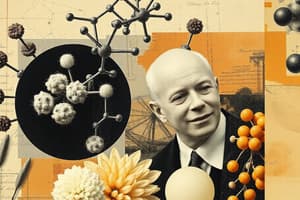Podcast
Questions and Answers
What is one product formed from the uronic acid pathway in the liver?
What is one product formed from the uronic acid pathway in the liver?
The uronic acid pathway leads to the formation of ATP.
The uronic acid pathway leads to the formation of ATP.
False (B)
What is the role of aldolase B?
What is the role of aldolase B?
Fructose metabolism is significantly affected by insulin levels.
Fructose metabolism is significantly affected by insulin levels.
Signup and view all the answers
What vitamin is synthesized from L-gulonate in the uronic acid pathway?
What vitamin is synthesized from L-gulonate in the uronic acid pathway?
Signup and view all the answers
Which of the following conditions may result from excessive fructose loading in the liver?
Which of the following conditions may result from excessive fructose loading in the liver?
Signup and view all the answers
Sorbitol can easily diffuse through cell membranes.
Sorbitol can easily diffuse through cell membranes.
Signup and view all the answers
Fructose metabolism in the liver leads to increased production of __________ concentrations.
Fructose metabolism in the liver leads to increased production of __________ concentrations.
Signup and view all the answers
Match the following conditions with their descriptions:
Match the following conditions with their descriptions:
Signup and view all the answers
Which enzyme converts glucose-6-phosphate to glucose-1-phosphate?
Which enzyme converts glucose-6-phosphate to glucose-1-phosphate?
Signup and view all the answers
Match the metabolic pathway with its description:
Match the metabolic pathway with its description:
Signup and view all the answers
D-glucose is converted to D-sorbitol by _____ reductase.
D-glucose is converted to D-sorbitol by _____ reductase.
Signup and view all the answers
Humans can synthesize ascorbic acid from glucuronate.
Humans can synthesize ascorbic acid from glucuronate.
Signup and view all the answers
What condition results from the accumulation of fructose-1-phosphate due to a deficiency in aldolase B?
What condition results from the accumulation of fructose-1-phosphate due to a deficiency in aldolase B?
Signup and view all the answers
What are two consequences of large intakes of fructose?
What are two consequences of large intakes of fructose?
Signup and view all the answers
What is the primary energy source for sperm cells?
What is the primary energy source for sperm cells?
Signup and view all the answers
Study Notes
Uronic Acid Pathway
- An alternative pathway for glucose oxidation
- Does not produce ATP
- Occurs in the liver
- Converts glucose to glucuronic acid, ascorbic acid (vitamin C - except in humans), and pentoses
- UDPGlc is oxidized to UDP-glucuronate (active form) by NAD-dependent UDPGlc dehydrogenase
- Glucuronate is highly polar
- Glucuronate is used in the synthesis of:
- Proteoglycans
- Glucuronide conjugates (steroids, bilirubin, drugs)
- More soluble and excretable in urine or bile
- Glucuronate is reduced to L-gulonate, a precursor for ascorbate (vitamin C) in animals
- Humans lack L-gulonolactone oxidase, so ascorbic acid cannot be synthesized
- Enzyme deficiencies and some drugs can disrupt the uronic acid pathway
- Essential pentosuria: rare, benign hereditary condition due to a lack of xylulose reductase
- High levels of xylulose in the urine
- Drugs that activate the uronic acid pathway:
- Barbital
- Chlorobutanol
- Aminopyrine
- Antipyrine
Fructose Metabolism
- Source: Sucrose, high-fructose syrups (HFS)
- Fructose metabolism is rapid in the liver due to bypassing the regulatory step catalyzed by phosphofructokinase
- Leads to an increase in:
- Fatty acid synthesis and esterification
- Serum triacylglycerols
- LDL cholesterol concentrations
- Fructokinase in the liver, kidney, and intestines converts fructose to fructose-1-phosphate
- Fructokinase activity is not affected by fasting or insulin, explaining why fructose is cleared from the blood of diabetic patients at a normal rate.
- Aldolase B in the liver cleaves fructose-1-phosphate to D-glyceraldehyde and dihydroxyacetone phosphate
- D-Glyceraldehyde enters glycolysis via phosphorylation to glyceraldehyde-3-phosphate by triokinase
- Dihydroxyacetone phosphate and glyceraldehyde-3-phosphate can be degraded by glycolysis or used as substrates for aldolase and gluconeogenesis
Conversion of Glucose to Fructose (Polyol Pathway)
- Aldose reductase converts D-glucose to D-sorbitol
- Sorbitol dehydrogenase in the liver converts sorbitol into fructose
- These reactions are important in the seminal vesicles for sperm cells, which utilize fructose as a primary carbohydrate energy source.
- Loading the liver with fructose can exacerbate:
- Hypertriacylglycerolemia
- Hypercholesterolemia
- Hyperuricemia
- Depletion of inorganic phosphate, accumulation of fructose-1-phosphate, and decreased ATP levels can cause adenine to be converted to uric acid, leading to hyperuricemia.
- Decreased ATP availability affects gluconeogenesis and can result in hypoglycemia.
- If fructose is not removed from the diet, liver failure and death can occur.
- Essential fructosuria: Benign and asymptomatic condition due to a lack of hepatic fructokinase.
- High oral doses of fructose can lead to osmotic diarrhea as it is passively absorbed by small intestine
- Hereditary fructose intolerance:
- Due to aldolase B deficiency
The Effect of Hyperglycemia on Sorbitol Metabolism
- Increased activity of the polyol pathway in tissues that are not insulin-sensitive (lens, peripheral nerves, renal glomeruli) as glucose concentration rises
- If sorbitol dehydrogenase is deficient, sorbitol accumulates.
- This causes osmotic damage as sorbitol does not pass through cellular membranes.
- Contributes to cataract formation, peripheral neuropathy, and vascular problems leading to nephropathy and retinopathy
Galactose Metabolism
- From lactose
- Galactose is converted to glucose in the liver
- Galactose is synthesized from glucose in the lactating mammary glands
- Required for the synthesis of:
- Glycolipids
- Proteoglycans
- Glycoproteins
Studying That Suits You
Use AI to generate personalized quizzes and flashcards to suit your learning preferences.
Related Documents
Description
This quiz explores the uronic acid pathway, an alternative route for glucose oxidation that occurs in the liver. Learn about its key functions, such as converting glucose into glucuronic acid and its role in the synthesis of essential compounds. Additionally, discover the impacts of enzyme deficiencies and certain drugs on this metabolic pathway.


